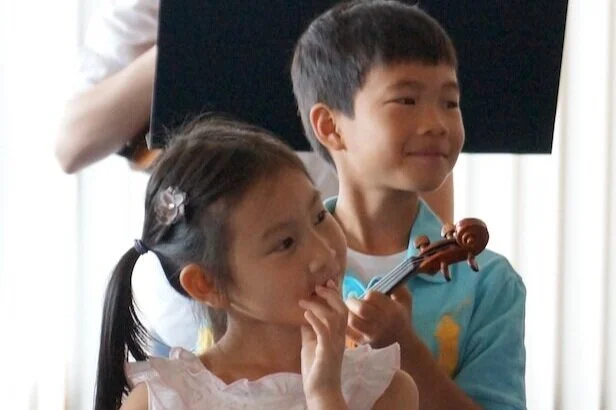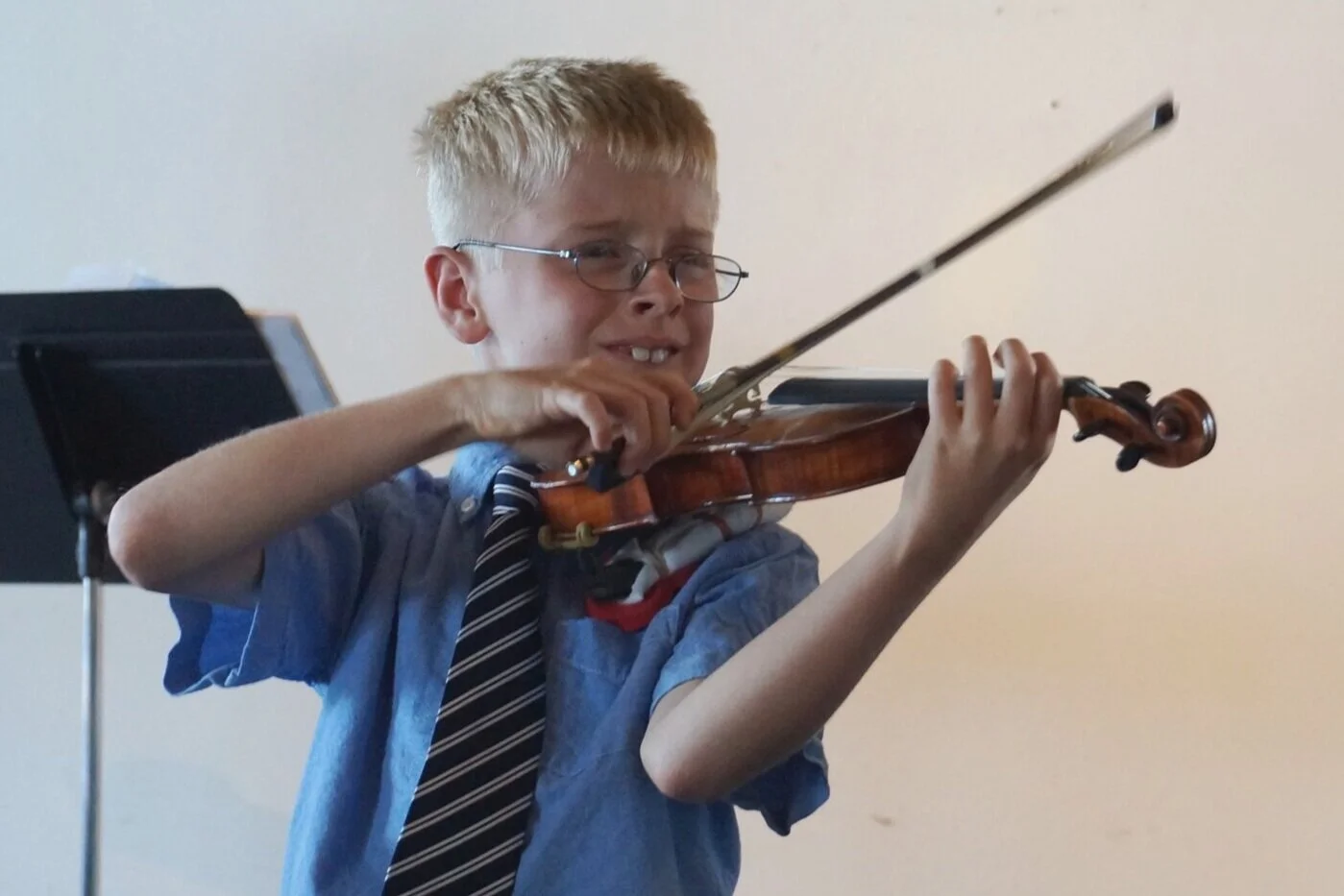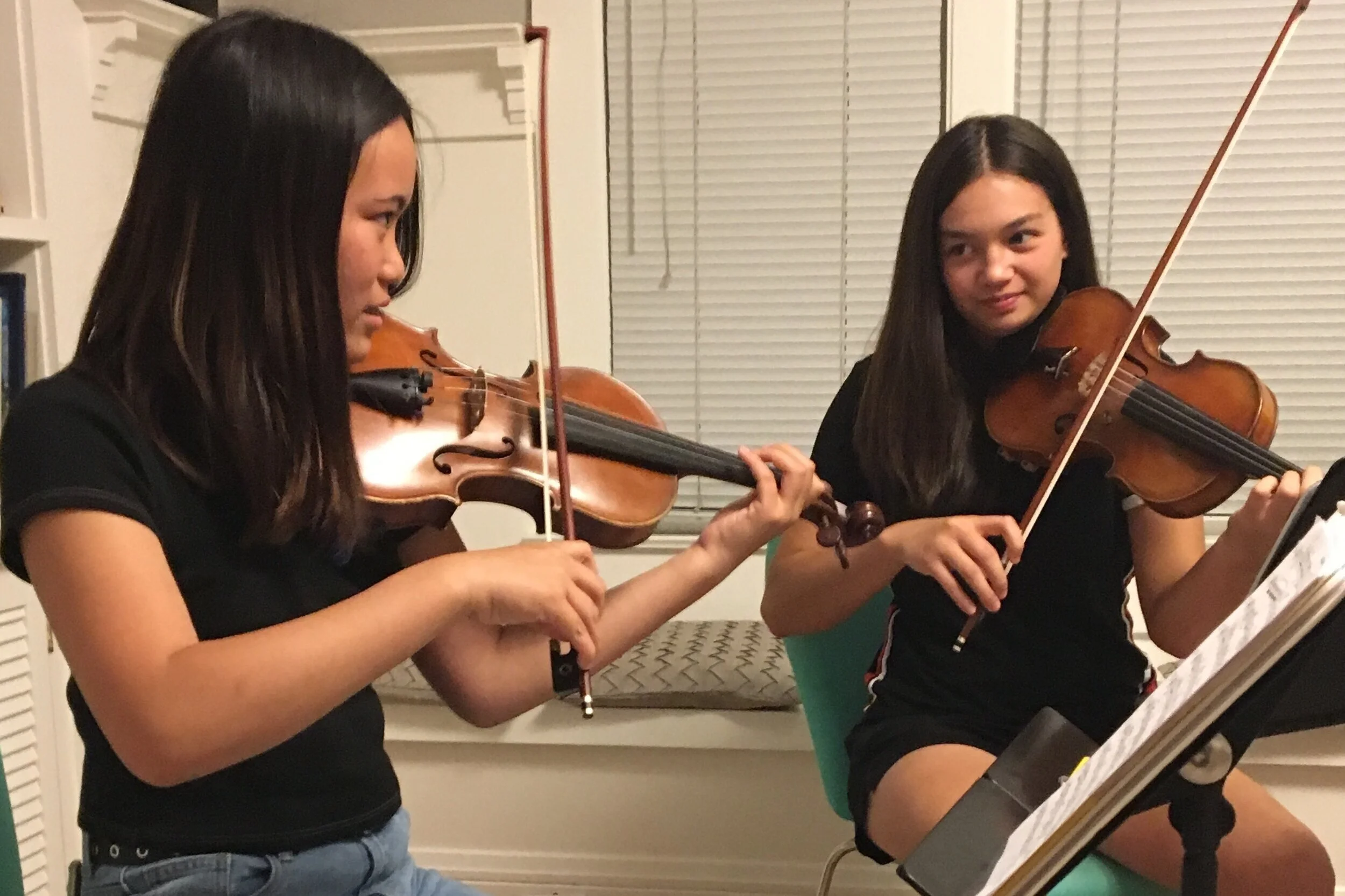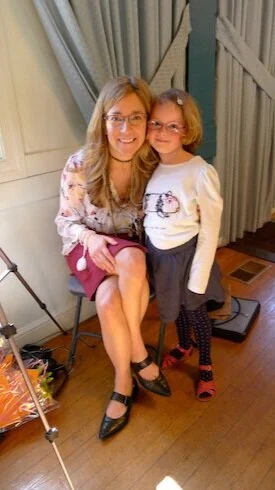The program
The East Bay Integrative Music Program offers violin and viola lessons, group classes, and chamber music coachings for students at all levels. Students range from young beginners partnering with their parent within the context of the Suzuki method through older, more advanced students deepening their skills, ownership, and level of engagement. Students develop skills necessary for full and easeful participation in whatever direction their music takes them while enjoying the support of their parents, teacher, and the students around them.
Continue reading below To see more about each ASpect of the educational offerings.
GROWTH
Get in touch
Picking the music program that is right for you and your child can be tricky. To make sure this program is right for you, I offer free consultations to discuss your needs and goals, share what this program offers, and explore to what extent our values align.
Book a ConSULTATION OR OBSERVATION ▸
SUZUKI METHOD; WHOLE CHILD EDUCATION
East Bay Integrative Music’s Suzuki Program utilizes the core principles of the the Suzuki method as the backbone towards establishing the foundation for mastery of the instrument, practice skills for consistent learning, and parental and community support for ease, engagement, and joy. Students learn with the support and partnership of a parent who attends their lessons, practices with them at home, and helps to bring music into their environment. Parents are given tools both with in and outside the lesson to help guide their child through daily practice so children can find the ease and consistent growth to keep them motivated and engaged. Besides private lessons with their parent, students participate in a group class with other students of similar age and level to increase their level of joy, build their skills for playing with others, and offer a greater variety of activities to keep learning interesting. Besides lessons and group, students participate in three concerts and recitals each year and can choose to participate in casual practice performance gatherings, expand their learning with chamber music, and explore other activities within the community based on their own interest.
ENGAGEMENT
TRADITIONAL; INTEGRATIVE EDUCATION for ADVANCED AND ADVANCING STUDENTS
Whether traditional or Suzuki, students at all points of their education are given activities to development of the skills needed to read fluently, exercises to build mastery of the physical aspects of playing, ability to make objective observations independently, and problem solving skills needed for independent practice and ownership. As students advance and grow their ability take ownership of their practice and learning, problem solve and elevate their awareness of the details of their playing, and expand their repertoire outside and beyond the Suzuki repertoire, the difference between the two types of education considerably blurs. By the time students have completed Book 4, whether Suzuki students or traditional students using the books, all students have explored other repertoire and genres in group, had opportunities to do chamber music as part of the program or small projects with friends, and explored repertoire by other composers outside the Suzuki books. Students at almost every level, not just advanced students who have worked beyond the final Mozart Violin Concert at the end of the Suzuki books, learn material sometimes accidentally only associated with a more traditional methods of music education. Even at the earliest stages, students explore scales and arpeggios, reading (if that is a new skill) or advanced etudes, exercises aimed at developing the skills necessary for upcoming repertoire, supportive practice strategies, and the repertoire itself. Students old enough, who have garnered observation, organizational, and problem solving skills gradually receive the reins of their education and while parents continue to support them emotionally and facilitate some logistics, students use their own skills to self assess, problem solve, and take ownership of their learning.
COMMUNITY
Chamber music; Informed decision making, COMMUNICATION, engagement, teamwork
One of the greatest gifts music brings to its participants is how it brings them together, both to make and share music. The chamber music students develop a deep experience of music, critical thinking, independence, and ownership along with communication skills necessary for teamwork and developing a shared vision. Interested students expand their musical education by playing in smaller ensembles like duets, trios, and quartets based on level, social compatibility, and interest level. With their own part, students expand their abilities to hold their own while contrasting parts are played by others, coordinate those parts with others, be aware of multiple parts at once, make musical decisions based on musical structure and the coordinating harmonies of the various parts while tapping into their own instincts and reactions to the music they hear. Beyond music, students learn to communicate freely and peacefully with each other as a strategy to engage everyone in making fully engaged, explored, and informed musical options on their path towards a shared vision. Students meet weekly between 30 - 60 minutes each time, perform 2 -3 times a year, and have the option to participate in community auditions and events, and one off weekend retreats.
Danielle Charboneau
director; Educator
Danielle Charboneau
A transplant to the California Bay Area, Danielle began her violin and viola teaching at a number of programs in her native Michigan. With a Bachelors and Masters in Violin performance, a Specialization in Dance, Pedagogy study with Judy Palac, and the completion of her Suzuki teacher training with a variety of trainers including Linda Fiore, James Maurer, and Almita Vamos, Danielle integrates concepts from many pedagogical, body use, and communication modalities.
While Danielle’s teaching began with the encouragement of her then teacher, Katie Lortz, long before attending university, the bulk of her first teaching experiences began at the Michigan State University Community Music Program where she developed a number teaching aids, etudes, and curriculums. While teaching at MSU Danielle was a member of a number of symphony orchestras including Lansing Symphony, Midland Symphony, and the Jackson Symphony Orchestra. After moving to Chicago, Danielle continued performing with the addition of more frequent larger chamber music groups, quartets and quintets, including Neun Solisten while teaching at both the DePaul Community Music Department and the Music Institute of Chicago.
Beyond teaching and in support of her beliefs in the power of community as a tool for elevating the reach of educational initiatives, Danielle has held a number of administrative and board positions. Danielle’s board positions include president of the Chicago Area Suzuki Association and the Suzuki Association of Northern California branch of the Suzuki Music Association of California. Some of her administrative positions include Director of the Michigan State University Community Music School Tour Group, Movement for Musicians, and Chamber Music Program. And at the Music Institute of Chicago, Danielle was the chair of the faculty committee, string coordinator, and liaison between faculty, administration, and board. Most recently Danielle held the position of Director of the Advanced Suzuki Institute at Stanford and the President of the Sun Francisco branch of ASTA and is currently the director of a collaborative and whole child chamber music partnership program, Integrative Chamber Music, in the San Francisco bay area.
In support of Danielle’s belief that music education is whole child education, Danielle completed mediation training with the Chicago Center for Conflict Resolution, the Non Violent Communication Leadership Training with BayNVC, and UC Berkeley. From this, she draws many of her ideas for helping parents work with their children and chamber groups work with each other. With her training in Alexander Technique, Integrative Manual Therapy, Body Mapping, and other modalities she draws material for research and exploration of strategies for injury prevention and technical development facilitation.
At present, Danielle focuses her efforts on bringing together her training as a Suzuki teacher, her experience teaching more traditional pedagogy, her exploration of body use treatments and practices, as well as mediation and communication practices to teach the whole child whether the child is partnering with their parent, independent, or engaged in ensemble playing. Danielle continues to be an advocate for learning that supports the child’s heart, not just their skill level. And as such continues to explore healthy strategies for more easeful learning and communication skills for more joy filled and peaceful engagement with their parents, other students, and themselves.
Education
SUZUKI TEACHER TRAINING
Books 1 - 10 Suzuki Principles in Action Practicum Every Child Can
MEDIATION and COMMUNICATION TRAINING
UC Berkeley Mediation Chicago Center for Conflict Resolution NVC Leadership Program California Lawyers for the Arts
MICHIGAN STATE UNIVERSITY
Masters; Music Performance, 1993 Applied Music, 1990
MICHIGAN STATE UNIVERSITY
Applied Music, 1990
Activities & Affiliations
• Suzuki Association of the Americas
• American String Teachers Association; SF Branch; Past Board President
• Suzuki Music Association of California, Suzuki Assoc. of Northern California Branch; Past President . California Lawyers for the Arts
Past Positions
• Michigan State University Community Music; faculty and tour group director Music Institute of Chicago; faculty and string coordinator DePaul University Community Music; faculty Advanced Suzuki Institute at Stanford; director





